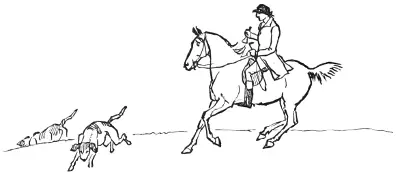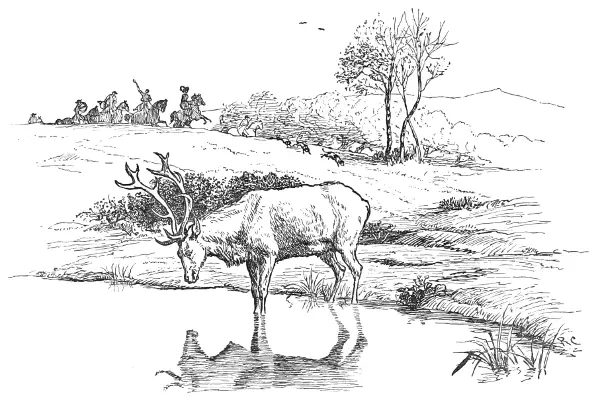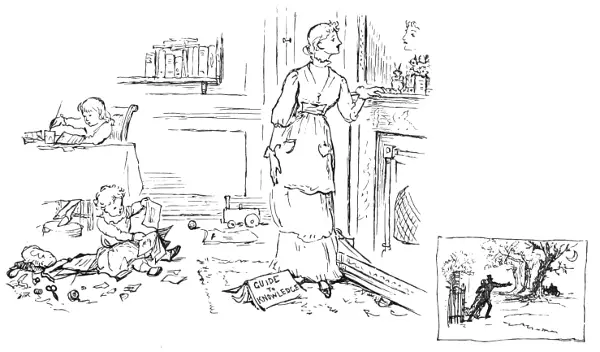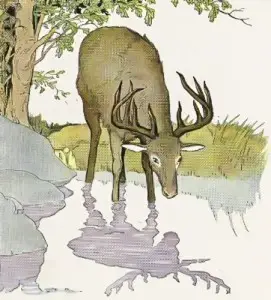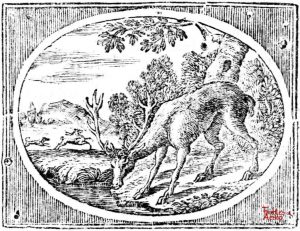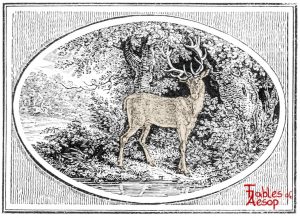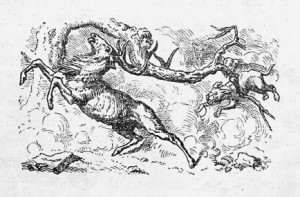A Stag admired his antlers in a pool but was chased away by a hunter. The hunter was able to catch up when the Stag got his antlers caught in a tree.
We often despise what is most useful to us.

Eliot/Jacobs Version
The Hart was once drinking from a pool and admiring the noble figure he made there. “Ah,” said he, “where can you see such noble horns as these, with such antlers! I wish I had legs more worthy to bear such a noble crown; it is a pity they are so slim and slight.” At that moment a Hunter approached and sent an arrow whistling after him. Away bounded the Hart, and soon, by the aid of his nimble legs, was nearly out of sight of the Hunter; but not noticing where he was going, he passed under some trees with branches growing low down in which his antlers were caught, so that the Hunter had time to come up. “Alas! alas!” cried the Hart: “We often despise what is most useful to us.”

Caldecott (A Stag Looking Into The Water)
A Stag parched with thirst came to a spring of water. As he was drinking he saw his own reflection on the water, and was in raptures with his horns when he observed their splendid size and shape, but was troubled about his legs, they seemed so thin and weak. As he was still musing, some huntsmen with a pack of hounds appeared and disturbed him, whereupon the Stag took to flight, and keeping a good distance ahead so long as the plain was free from trees, he was being saved; but when he came to a woody place he got his horns entangled in the branches, and being unable to move was seized by the hounds. When he was at the point of death he said to himself: “What a fool am I, who was on the way to be saved by the very things which I thought would fail me; while by those in which I so much trusted I am brought to ruin.”

Aesop For Children (The Stag and His Reflection)
A Stag, drinking from a crystal spring, saw himself mirrored in the clear water. He greatly admired the graceful arch of his antlers, but he was very much ashamed of his spindling legs.
“How can it be,” he sighed, “that I should be cursed with such legs when I have so magnificent a crown.”
At that moment he scented a panther and in an instant was bounding away through the forest. But as he ran his wide-spreading antlers caught in the branches of the trees, and soon the Panther overtook him. Then the Stag perceived that the legs of which he was so ashamed would have saved him had it not been for the useless ornaments on his head.
Moral
We often make much of the ornamental and despise the useful.

Townsend version
A Stag overpowered by heat came to a spring to drink. Seeing his own shadow reflected in the water, he greatly admired the size and variety of his horns, but felt angry with himself for having such slender and weak feet. While he was thus contemplating himself, a Lion appeared at the pool and crouched to spring upon him. The Stag immediately took to flight, and exerting his utmost speed, as long as the plain was smooth and open kept himself easily at a safe distance from the Lion. But entering a wood he became entangled by his horns, and the Lion quickly came up to him and caught him. When too late, he thus reproached himself: “Woe is me! How I have deceived myself! These feet which would have saved me I despised, and I gloried in these antlers which have proved my destruction.”
Moral
What is most truly valuable is often underrated.

Samuel Croxall (The Stag looking into the Water)
A STAG that had been drinking at a clear spring, saw himself in the water; and, pleased; with the prospect, stood afterwards for some time contemplating and surveying his shape and features, from head to foot. Ah! says he, what a glorious pair of branching horns are there! how gracefully do those antlers hang over my forehead, and give an agreeable turn to my whole face! If some other parts of my body were but proportionable to them, I would turn my back to nobody; but I have a set of such legs as really makes me ashamed to see them. People may talk what they please of their conveniences, and what great need we stand in of them, upon several occasions; but, for my part, I find them so very slender and unsightly, that I had as lief have none at all. While he was giving himself these airs, he was alarmed with the noise of some huntsmen and a pack of hounds, that had been just laid on upon the scent, and were making towards him. Away he flies in some consternation, and, bounding nimbly over the plain, threw dogs and men at a vast distance behind him. After which, taking a very thick copse, he had the ill-fortune to be entangled by his horns in a thicket; where he was held fast, till the hounds came in and pulled him down. Finding now how it was like to go with him, in the pangs of death, he is said to have uttered these words: Unhappy creature that I am! I am too late convinced, that what I prided myself in, has been the cause of my undoing; and what I so much disliked, was the only thing that could have saved me.
THE APPLICATION
Perhaps we cannot apply this better, than by supposing the fable to be a parable; which may be thus explained. The Deer, viewing itself in the water, is a beautiful young lady at her looking-glass. She cannot help being sensible of the charms which lie blooming in every feature of her face. She moistens her lips, languishes with her eyes, adjusts every lock of her hair with the nicest exactness, gives an agreeable attitude to her whole body; and then, with a soft sigh, says to herself, Ah! how happy might I be in a daily crowd of admirers, if it were not for the censoriousness of the age! When I view that face, where nature, to give her her due, has been liberal enough of charms, how easy should I be if it were not for that slender particular: my honour. The odious idea of that comes across all my happy moments, and brings a mortification with it that damps my most flattering, tender hopes. Oh! that there were no such thing in the world! In the midst of these soliloquies, she is interrupted by the voice of her lover, who enters her chamber singing a rigadoon air; and, introducing his discourse in a familiar easy manner, takes occasion to launch out in praise of her beauty, sees she is pleased with it, snatches her hand, kisses it in a transport; and in short, pursues his point so close, that she is not able to disengage herself from him. But, when the consequence of all this approaches, in an agony of grief and shame, she fetches a deep sigh, and says, Ah! how mistaken have I been! the virtue I slighted might have saved me; but the beauty I prized so much has been my undoing.

Thomas Bewick (The Stag Looking Into The Water)
A Stag drinking, saw himself in the water, and pleased with the sight, stood contemplating his shape. Ah, says he, what a glorious pair of branching horns are here, how gracefully do these antlers project over my forehead, and give an agreeable turn to my whole face; but I have such legs as really make me ashamed; they look so very long and unsightly, that I had rather have none at all. In the midst of this soliloquy, he was alarmed with the cry of a pack of hounds. Away he flies in some consternation, and bounding nimbly over the plain, threw dogs and men at a vast distance behind him. After which, taking a very thick copse, he had the ill fortune to be entangled by his horns in the branches, where he was held fast till the hounds came up and seized him. In the pangs of death, he is said to have uttered these words: Unhappy creature that I am, I am too late convinced that what I prided myself in, has been the cause of my undoing; and what I so much disliked, was the only thing that could have saved me.
APPLICATION
We often make a false estimate, in preferring our ornamental talents to our useful ones, and are apt to place our love and admiration on wrong objects. When our vanity is stronger than our reason, show and ostentation find easy admission into our hearts, and we are much fonder of specious trifles than useful plainness. But the truest mark of wisdom is to estimate things at their just value, and to know whence the most solid advantages may be derived: otherwise, like the Stag in the Fable, we may happen to admire those accomplishments which are not only of no real use, but often prove prejudicial to us, while we despise those things on which our safety may depend. He that does not know himself, will often form a false judgment upon other matters that most materially concern him; and thus it fares with many, who suffer themselves to be deluded with the false pomp of high life, and whose vanity prompts them to conceive they possess talents which qualify them to shine in that circle, into which, had they judged rightly, they never would have entered, but rather have applied themselves to improve other qualifications, which might have insured their own happiness, and have rendered them useful members of society.

JBR Collection
A Stag drinking at a clear pool, admired the handsome look of his spreading antlers, but was much displeased at the slim and ungainly appearance of his legs. “What a glorious pair of branching horns!” said he. “How gracefully they hang 0ver my forehead! What an agreeable air they give my face! But as for my spindle-shanks of legs, I am heartily ashamed of them.” The words were scarcely out of his mouth, when he saw some huntsmen and a pack of hounds making towards him. His despised legs soon placed him at a distance from his followers, but, on entering the forest, his horns got entangled at every turn, so that the dogs soon reached him and made an end of him. “Mistaken fool that I was!” he exclaimed; “had it not been for these wretched horns my legs would have saved my life.”

L’Estrange version (A Stag Drinking)
As a stag was drinking upon the bank of a clear stream, he saw his image in the water, and entered into this contemplation upon’t. Well! says he, if these pityful shanks of mine were but answerable to this branching head, I can but think how I should defy all my enemies. The words were hardly out of his mouth, but he discover’d a pack of dogs coming full-cry towards him. Away he scours cross the fields, casts off the dogs, and gains a wood; but pressing thorough a thicket, the bushes held him by the horns, till the hounds came in, and pluck’d him down. The last thing he said was this. What an unhappy fool was I, to take my friends for my enemies, and my enemies for my friends! I trusted to my head, that has betray’d me, and I found fault with my leggs, that would otherwise have brought me off.
Moral
He that does not thoroughly know himself, may be well allowed to make a false judgment upon other matters that most nearly concern him.

Cervus et Cornua Eius
Cervus ad fontem stabat, sitiens, ut biberet aquam. Hic dum in aqua videt effigiem suam, tenuitatem crurum vituperat, laetatur vero forma cornuum. Repente venatores adsunt eumque persequuntur. Quamdiu per campum fugam facit, pernicitate pedum evadit. Cum vero imprudens attingisset silvam, cornua sunt implicita ramis. Comprehensus deinde, cum luctu haec verba edidit, “Heu misero mihi, qui iis quae vituperaram servatus sum; quibus autem gloriatus fueram, perii.”
Perry #074
